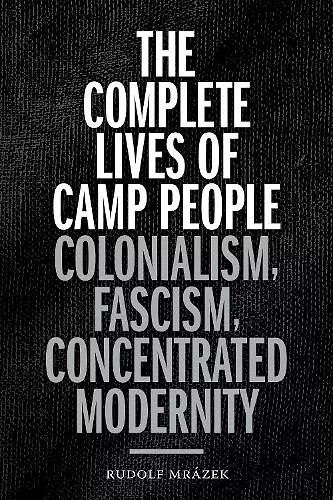The Complete Lives of Camp People
Colonialism, Fascism, Concentrated Modernity
Format:Paperback
Publisher:Duke University Press
Published:17th Jan '20
Should be back in stock very soon

In The Complete Lives of Camp People Rudolf Mrázek presents a sweeping study of the material and cultural lives of twentieth-century concentration camp internees and the multiple ways in which their experiences speak to the fundamental logics of modernity. Mrázek focuses on the minutiae of daily life in two camps: Theresienstadt, a Nazi “ghetto” for Jews near Prague, and the Dutch “isolation camp” Boven Digoel—which was located in a remote part of New Guinea between 1927 and 1943 and held Indonesian rebels who attempted to overthrow the colonial government. Drawing on a mix of interviews with survivors and their descendants, archival accounts, ephemera, and media representations, Mrázek shows how modern life's most mundane tasks—buying clothes, getting haircuts, playing sports—continued on in the camps, which were themselves designed, built, and managed in accordance with modernity's tenets. In this way, Mrázek demonstrates that concentration camps are not exceptional spaces; they are the locus of modernity in its most distilled form.
“The Complete Lives of Camp People is quite simply an extraordinary, provocative, challenging, and brilliant work. Offering an audacious theorization of modernity via modernity's twin forms of violence—colonialism and the camp—Rudolf Mrázek has written perhaps the finest book I have read this decade.” -- Rosalind C. Morris, Professor of Anthropology, Columbia University
“The Complete Lives of Camp People is a stunning collage assembled from witness testimonies, administrative instructions, philosophical reflections, and poetic illuminations. By juxtaposing the stories of two ‘model camps’—Boven Digoel and Theresienstadt—Rudolf Mrázek explores the sensory, material, experiential, and spatial dimensions of twentieth-century internment camps. This is the ‘thickest description’ of camp life yet to appear in print, providing valuable insights into a ubiquitous feature of modernity.” -- Iris Rachamimov, Tel Aviv University
"A strength of this work is its emphasis on portraying the lives of camp people as they lived them. Mrázek leads his reader through the quotidian activities of the camps, touching on theatre, music, study—even the geography of the camps in their block arrangements. . . . Mrázek has provided the means of developing entirely new analyses of the history of concentration camps." -- Brenda Melendy * International Social Science Review *
"This book offers an urgent reminder, and its remarkable range of engagement with thinkers—from Levinas to Isaac Bashevis Singer—gives it the energy of a living conversation. A useful intervention into holocaust and genocide studies, this work should be included in courses on empire and colonization more generally . . . plus chapters could serve as productive additions to a range of classroom conversations." -- Spencer Dew * Religion and Law *
"With this book, Mrázek offers readers a rich, complex picture that greatly enhances existing knowledge of concentration camps in the previous century. . . . Supported by rigorous research and the author's lucid writing style, this volume is an interesting read. Recommended. Upper-division undergraduates through faculty." -- Q. E. Wang * Choice *
"This book offers a well-rounded perspective on camp lives that are often overlooked and unimagined. . . . [Mrázek's] portrayal of the internees is also humanizing and compassionate. All in all, this book is recommended for those interested in exploring more on the everyday life in the camps." -- Amrina Rosyada * Journal of the Humanities and Social Sciences of Southeast Asia *
"Brilliant, moving and deeply disturbing . . ." -- Danilyn Rutherford * Journal of Social Issues in Southeast Asia *
"This book offers an urgent reminder, and its remarkable range of engagement with thinkers—from Levinas to Isaac Bashevis Singer—gives it the energy of a living conversation. A useful intervention into holocaust and genocide studies, this work should be included in courses on empire and colonization more generally." -- Spencer Dew * Religious Studies Review *
ISBN: 9781478006671
Dimensions: unknown
Weight: 726g
496 pages